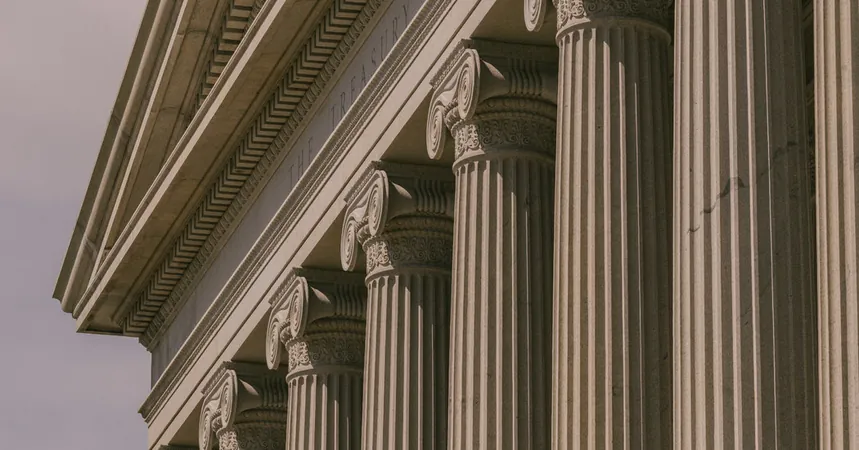
Trump's Tariff Chaos: A Wrench in the Engines of U.S. Bond Stability
2025-04-13
Author: Wai
The Unraveling Trust in U.S. Bonds
In the unpredictable world of finance, one thing used to be certain: when panic hits, investors flock to U.S. government bonds, viewing them as the ultimate safe haven. These Treasuries were seen as the rock-solid promise of a dependable federal government, regardless of looming financial crises, wars, or disasters.
A Radical Shift in Investor Sentiment
However, recent turmoil in the bond markets has thrown a wrench into this age-old belief. President Trump's aggressive trade war, particularly against China, has not only sparked fears of a global economic downturn but has also cast shadows on America's credibility as a stable economic leader. Political economist Mark Blyth articulated this sentiment, stating that the global community now perceives the U.S. government as directionless and erratic.
Bond Market Frenzy and Rising Yields
The fallout? A notable sell-off in the bond market. When investors panic, they begin dumping bonds, prompting the government to offer higher interest rates to attract buyers. As a result, the 10-year Treasury yield surged from just under 4% to approximately 4.5%—the steepest jump seen in nearly 25 years. Concurrently, the dollar's value has been declining, even though tariffs typically bolster it.
Speculators and Foreign Reserves: A Dangerous Game
Compounding the situation are actions taken by hedge funds and investors, scrambling to liquidate their bond holdings amidst plummeting stock prices. Notably, there's apprehension that China, with $761 billion in U.S. Treasures and a colossal foreign reserve of $3 trillion, might also be offloading its bonds in retaliation for American tariffs.
A Diminishing American Financial Fortress
This tumult means the U.S. is gradually shifting from a bastion of stability to a zone of uncertainty within global finance. Much to Blyth's point, Treasury bills are morphing from once-reliable investments into high-risk assets, vulnerable to market turbulence.
The Price of Tariffs: Higher Costs Ahead
While the Trump administration claims that tariffs will ultimately restore manufacturing jobs, economists argue that the current trade strategies lack coherence and stability. Critics suggest that random tariff implementations have not only unsettled investor confidence but could also trigger a wider economic fallout.
A Unique Privilege at Risk
For years, the U.S. has enjoyed a unique privilege in global finance, with low-interest borrowing thanks to foreign investments. This has lowered costs for mortgages and credit—factors vital for consumer spending. Yet, the ongoing trade tensions and a potential loss of foreign confidence in U.S. debt threaten this status.
The Cost of Economic Disruption
Instead of a smooth transition to a more self-sufficient economy, many economists believe the tariffs will cripple American factories reliant on imported components. With arbitrary tariff rates adding to the chaos, industry experts worry that higher bond yields could lead to increased government borrowing costs, cutting into essential public funding and potentially leading the nation into a recession.
The Economic Ripple Effects
As household costs for loans and mortgages rise, consumer spending may plummet, impacting businesses across the board. The grim reality is that the bond market's instability and rising costs could tighten the economic noose, pushing Americans closer to an uncertain financial future.



 Brasil (PT)
Brasil (PT)
 Canada (EN)
Canada (EN)
 Chile (ES)
Chile (ES)
 Česko (CS)
Česko (CS)
 대한민국 (KO)
대한민국 (KO)
 España (ES)
España (ES)
 France (FR)
France (FR)
 Hong Kong (EN)
Hong Kong (EN)
 Italia (IT)
Italia (IT)
 日本 (JA)
日本 (JA)
 Magyarország (HU)
Magyarország (HU)
 Norge (NO)
Norge (NO)
 Polska (PL)
Polska (PL)
 Schweiz (DE)
Schweiz (DE)
 Singapore (EN)
Singapore (EN)
 Sverige (SV)
Sverige (SV)
 Suomi (FI)
Suomi (FI)
 Türkiye (TR)
Türkiye (TR)
 الإمارات العربية المتحدة (AR)
الإمارات العربية المتحدة (AR)